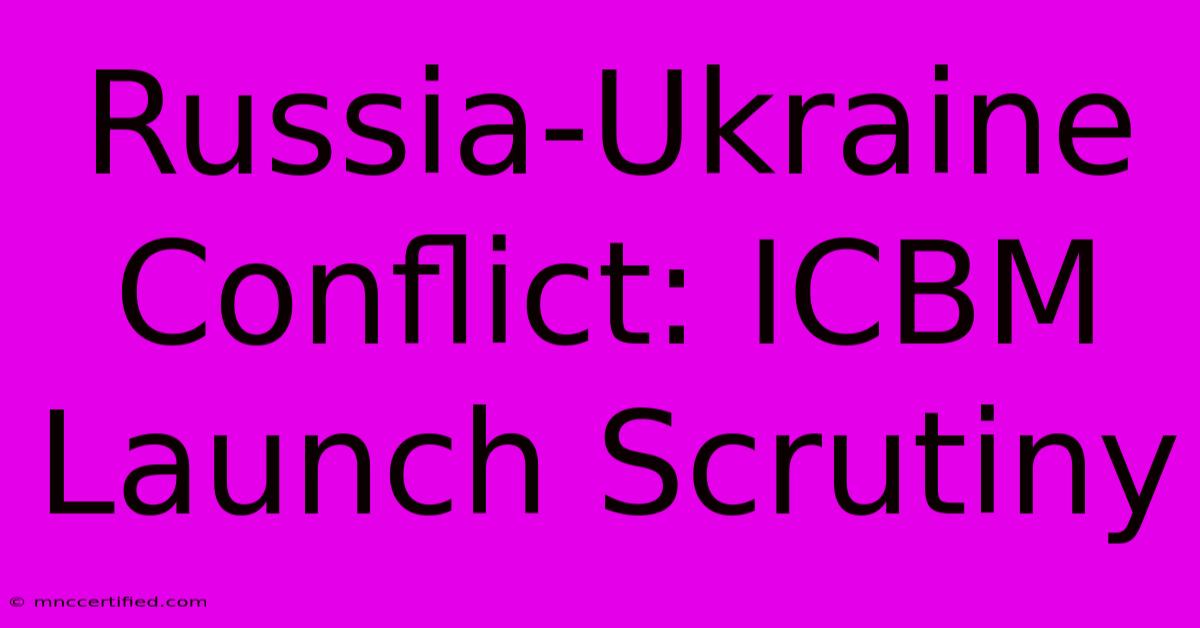Russia-Ukraine Conflict: ICBM Launch Scrutiny

Table of Contents
Russia-Ukraine Conflict: ICBM Launch Scrutiny – A Global Security Concern
The ongoing Russia-Ukraine conflict has introduced a new layer of global instability, extending far beyond the immediate battlefield. The heightened tensions have brought the threat of intercontinental ballistic missile (ICBM) launches into sharper focus, prompting intense scrutiny from international observers and sparking anxieties about potential escalation. This article delves into the concerns surrounding ICBM launches in the context of the conflict, exploring the geopolitical implications and the measures being taken to mitigate risks.
The Increased Risk of ICBM Launches
While neither Russia nor Ukraine possesses a readily deployable ICBM arsenal currently, the conflict's escalation potential significantly increases the risk of ICBM-related incidents. Several factors contribute to this heightened concern:
-
Nuclear Deterrence: Both Russia and its neighboring nuclear powers, such as Belarus (hosting Russian tactical nuclear weapons), rely heavily on nuclear deterrence. The ongoing conflict creates a volatile environment where miscalculation or accidental escalation could trigger the use of nuclear weapons, potentially leading to ICBM deployment as a retaliatory measure. This risk is amplified by the intense emotional and political pressures surrounding the conflict.
-
Cyber Warfare and Disinformation: The conflict has seen an unprecedented level of cyber warfare and disinformation campaigns. These actions could potentially target early warning systems or command and control centers related to ICBM launches, leading to misinterpretations or accidental launches. The sophistication of modern cyberattacks presents a real threat to global security.
-
Escalation Dynamics: Any significant escalation of the conflict, such as the use of conventional weapons with devastating consequences, could prompt a response involving nuclear weapons, including ICBM launches. The unpredictable nature of the conflict makes it difficult to assess the precise threshold for such an escalation.
International Scrutiny and Monitoring Efforts
The potential for ICBM launches is being closely monitored by multiple international organizations and nations. Several key efforts are underway:
-
Satellite Surveillance: Sophisticated satellite systems continuously monitor missile launches and related activities around the globe. These systems provide crucial early warning capabilities, allowing for timely responses to potential threats.
-
Intelligence Gathering: Intelligence agencies worldwide are actively collecting and analyzing information regarding the readiness posture of Russia's nuclear forces. This information helps to assess the likelihood of ICBM deployment and to identify potential indicators of impending launches.
-
International Diplomacy: Extensive diplomatic efforts are underway to de-escalate the conflict and prevent the use of nuclear weapons. These efforts aim to establish communication channels and build confidence between the involved parties.
Mitigation Strategies and Global Security
Addressing the threat of ICBM launches requires a multi-faceted approach:
-
Strengthening Early Warning Systems: Investing in and upgrading early warning systems is critical to providing sufficient time to react to potential missile launches. This includes enhancing satellite capabilities and improving data analysis techniques.
-
Improving Communication Channels: Clear and reliable communication channels between nuclear powers are essential to prevent misunderstandings and accidental escalation. This includes establishing direct lines of communication and fostering trust-building measures.
-
De-escalation and Conflict Resolution: Finding a peaceful resolution to the Russia-Ukraine conflict is paramount to reducing the risk of ICBM launches. International efforts focused on diplomacy and negotiations are vital in achieving this goal.
Conclusion: The Russia-Ukraine conflict significantly elevates the global risk of ICBM launches. The international community must remain vigilant, strengthening monitoring efforts, improving communication channels, and working relentlessly towards de-escalation to mitigate the devastating consequences of such a scenario. The future security of the world hinges on a collective commitment to prevent nuclear escalation. This necessitates not only technological solutions but also robust diplomatic initiatives to foster peace and stability.

Thank you for visiting our website wich cover about Russia-Ukraine Conflict: ICBM Launch Scrutiny. We hope the information provided has been useful to you. Feel free to contact us if you have any questions or need further assistance. See you next time and dont miss to bookmark.
Featured Posts
-
Strait Pays Tribute To Wife
Nov 21, 2024
-
Cma Awards 2024 Jelly Roll Brooks And Dunn
Nov 21, 2024
-
Cheap Car Insurance In Conroe Tx
Nov 21, 2024
-
Will Ai Replace Insurance Agents
Nov 21, 2024
-
Nvidia Revenue Surge Stock Price Effect
Nov 21, 2024